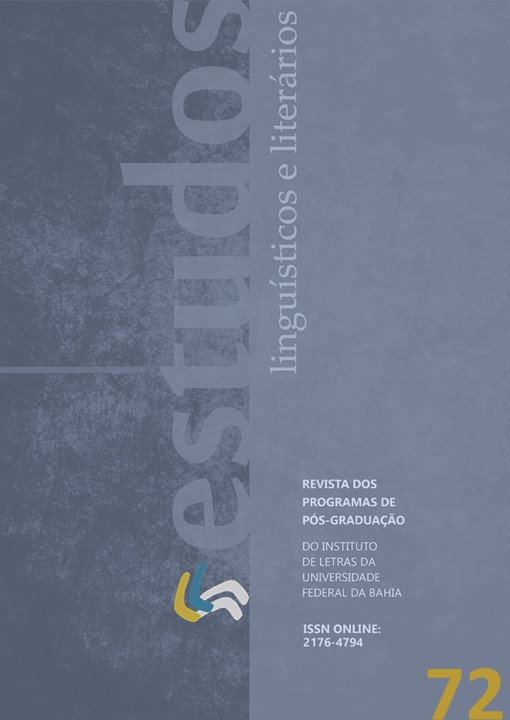COLLABORATIVE TEXT PRODUCTION IN SPECIALIZED EDUCATIONAL ATTENDANCE: SITUATING A LANGUAGE PRACTICE WITH THE SUPPORT OF DESIGN THINKING
DOI:
https://doi.org/10.9771/ell.i72.46606Keywords:
SEA, Collaboration, Design Thinking, Language practiceAbstract
This article discusses a pedagogical experience of a Specialized Educational Attendance (SEA) teacher in a school in southern Brazil. Thus, based on the experience report, it describes how a teacher articulated the Design Thinking approach in a practice of collaborative text production, planned and developed with the support of the student of SEA. The details of the report show that it was possible to use DT in SEA, and that the student's cultural repertoire was the starting point for the pedagogical organization in text production. It is hoped that the approach can integrate the decision-making and dynamics involving the SEA, highlighting the potential of collaboration, learning, and interactions in this specialized pedagogical service that can be reflected in the regular classroom. To this end, the possibilities and productions experienced with the use of this approach in the SEA are pointed out.
Downloads
References
ALLEN, N. et al. What experienced collaborators say about collaborative writing. Iowa State Journal of Business and Technical Communication, v. 1, n. 2, 1987. p. 70-90. https://doi.org/10.1177/105065198700100206
BANDEIRA, V. S. “[...] Ele precisa um espaço pra falar do jeito dele, né?”: A Sala de Recursos Multifuncionais e seu papel no desenvolvimento da linguagem de alunos indicados para atendimento educacional especializado. Dissertação de Mestrado. Programa de Pós Graduação em Linguística Aplicada - UNISINOS, 2020. Disponível em http://www.repositorio.jesuita.org.br/handle/UNISINOS/9335
BRASIL. Base Nacional Comum Curricular. Ministério da Educação – MEC, 2018. Disponível em: http://basenacionalcomum.mec.gov.br
BRASIL. Constituição da República Federativa do Brasil. Brasília, DF: Senado Federal, 1988.
BRASIL. Ministério da educação. Programa educação inclusiva: direito a diversidade. Brasília, 2004. Disponível em: http://portal.mec.gov.br/seesp/arquivos/pdf/aescola.pdf
DALTRO, M. R.; FARIA, A. A. Relato de experiência: Uma narrativa científica na pós-modernidade. Estud. pesqui. psicol., v. 19, n. 1, 2019. p. 223-237. https://doi.org/10.12957/epp.2019.43015
FERREIRO, E., TEBEROSKY, A. Psicogêneses da língua escrita. Porto Alegre: 1999.
GIL, A. C. Como elaborar projetos de pesquisa. 5. ed. São Paulo: Atlas, 2010.
GIL, A. C. Métodos e técnicas de pesquisa social. 6. ed. São Paulo: Atlas, 2008.
GONSALES, P. et al. Design Thinking para Educadores. Versão em Português: Instituto Educadigital. Tradução: Bianca Santana, Daniela Silva e Laura Folgueira. 2014. Sob licença Creative Commons Attribution – Non Commercial – Share Alike 3.0 Unported (CC BY-NC-SA 3.0). Disponível em: https://www.sedies.com.br/downloads/2017/ textos/tema7.pdf
HASHIM, A. M.; ARIS, S. R. A.; FOOK, C. Y. Promoting Empathy Using Design Thinking In Project Based Learning And As A Classroom Culture. Asian Journal of University Education, v. 15, 2019. p. 14-23. Disponível em: https://ir.uitm.edu.my/id/eprint/29763/1/K_ADILA%20MD%20HASHIM%20MEDC%20B%2019.pdf
ILDEBRAND, I. S. Língua Brasileira de Sinais e Língua Portuguesa no Ensino Médio: uma proposta de ensino com foca na língua e cultura surda. Dissertação de Mestrado. Programa de Pós-Graduação em Linguística Aplicada – UNISINOS, 2020. Disponível em: http://www.repositorio.jesuita.org.br/handle/UNISINOS/9333
ILDEBRAND, I. S.; FRONZA, C. A.; LUIZ, S. W. Quando a Libras visita a Língua Portuguesa: explorando o design thinking e o contato entre línguas no Ensino Médio. Linguagem & Ensino. 2020. https://doi.org/10.15210/rle.v23i4.18563
JÚNIOR, G. C. et al. Design Thinking & Comunicação Aumentativa e Alternativa como ferramentas para o ensino e auxílio de professores do Atendimento Educacional Especializado. In: Brazilian Symposium on Computers in Education (Simpósio Brasileiro de Informática na Educação-SBIE). 2018. p. 1173-1182. http://dx.doi.org/10.5753/cbie.sbie. 2018.1173
LOWRY, P.; CURTIS, A.; LOWRY, M. Building a taxonomy and nomenclature of collaborative writing to improve interdisci-plinary research and practice. Journal of Business Communication, v. 41, 2004. p. 66-99. http://dx.doi.org/10.1177/0021943603259363
MELLO, D. Contribuições do Design Thinking paraa educação: um estudo em escolas pri-vadas de Porto Alegre/RS. Dissertação de Mestrado. Programa de Pós-Graduação em Design – Universidade do Vale do Rio dos Sinos / UNISINOS, 2014. Disponível em http://www.repositorio.jesuita.org.br/handle/UNISINOS/3628
NOEL, L. Teaching and Learning Design Thinking through a Critical Lens at a Primary School in Rural Trinidad and Tobago. ProQuest LLC, Ph.D. Dissertation, North Carolina State University. 2018. Discponível em: https://repository.lib.ncsu. edu/handle/1840.20/35744
PINHEIRO, P. A. A escrita colaborativa por meio do uso de ferramentas digitais: ressignificando a produção textual no contexto escolar. Calidoscópio, v. 9, n. 3, p. 226-239, 2011. Disponível em: http://revistas.unisinos.br/index.php/calidoscop io/article/view/cld.2011.93.07
SPAGNOLO, C. A formação continuada de professores: o design thinking como perspectiva inovadora e colaborativa na educação básica. Tese de Doutorado. Programa de Pós-Graduação em Educação – Pontifícia Universidade Católica do Rio Grande do Sul / PUCRS, 2017. Disponível em: https://hdl.handle.net/10923/10396
ZIESMANN, C. I., GUILHERME, A. A. Inclusão no Atendimento Educacional Especializado na Educação Básica: um estudo de caso. Revista Contexto & Educação, v. 35, 2020. p. 86-104. https://doi.org/10.21527/2179-1309.2020. 110.86-104


